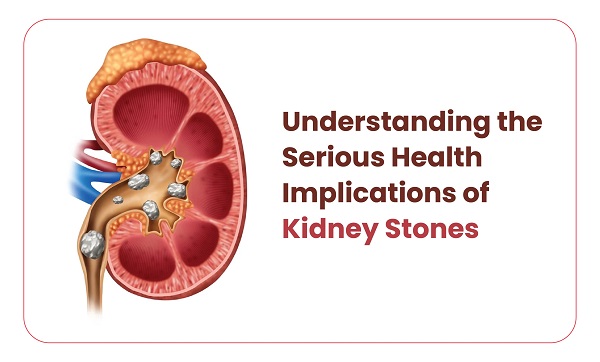Understanding the Serious Health Implications of Kidney Stones
Kidney stones, though small in size, can inflict significant pain and pose serious health risks if
left unaddressed. These tiny crystalline formations, typically formed from concentrated
minerals in the urine, can cause excruciating pain and discomfort as they pass through the
urinary tract. However, beyond the immediate agony, kidney stones can lead to
complications that extend far beyond mere discomfort, potentially impacting overall health
and well-being.
The Formation of Kidney Stones: Kidney stones develop when certain substances in the
urine, such as calcium, oxalate, and uric acid, become highly concentrated. When these
substances exceed the body's capacity to dilute them, they can crystallize and form stones.
Various factors, including genetics, diet, dehydration, and certain medical conditions,
contribute to the formation of kidney stones.
The Severity of Pain: One of the most immediate and intense consequences of kidney stones
is the excruciating pain they can cause. As the stones move through the urinary tract, they
can obstruct the flow of urine, leading to sharp, stabbing pain in the abdomen, back, or
groin. The pain may come in waves and be accompanied by nausea, vomiting, and blood in
the urine. This discomfort can significantly impair quality of life and may require medical
intervention for relief.
Complications of Kidney Stones: While the pain associated with kidney stones is formidable,
the potential complications they can cause are even more concerning. If a stone becomes
lodged in the urinary tract, it can block the flow of urine, leading to urinary tract infections
(UTIs) or even kidney damage. Chronic obstruction may impair kidney function over time,
increasing the risk of kidney disease or kidney failure.
Furthermore, individuals who have experienced kidney stones are at a higher risk of
developing recurrent stones. Each episode increases the likelihood of future occurrences,
perpetuating a cycle of discomfort and potential complications.
Beyond the urinary tract, kidney stones can also have systemic effects on overall health.
Research suggests a link between kidney stones and an increased risk of cardiovascular
disease, including heart attacks and strokes. The presence of kidney stones may indicate
underlying metabolic abnormalities that contribute to cardiovascular risk factors such as
hypertension and diabetes.
Prevention and Management: Given the serious health implications of kidney stones,
prevention and management strategies are crucial. Adequate hydration is key to diluting
urine and preventing the concentration of stone-forming substances. Dietary modifications,
such as reducing sodium and oxalate intake, can also help lower the risk of stone formation.
In some cases, medications may be prescribed to alter the composition of urine and prevent
stone formation.
For individuals prone to recurrent kidney stones or those experiencing complications,
medical intervention may be necessary. Treatments such as lithotripsy, which uses shock
waves to break up stones, or surgical removal may be recommended to alleviate symptoms
and prevent further complications.
Conclusion:
While kidney stones may seem like a minor inconvenience to some, they pose
significant health risks that should not be overlooked. Beyond the acute pain they cause,
kidney stones can lead to complications that impact urinary function, kidney health, and
cardiovascular well-being. Awareness of the serious health implications of kidney stones is
essential for prevention, early detection, and appropriate management, ultimately
safeguarding overall health and quality of life.
Dr. Vijay Patel is much sought after for Kidney stone treatment, particularly in South
Mumbai. Renowned for his unparalleled expertise and compassionate patient care, Dr. Patel
has solidified his reputation as the go-to kidney stone specialist in the region. With an
impressive track record he has garnered extensive experience in all facets of kidney stone
management.


